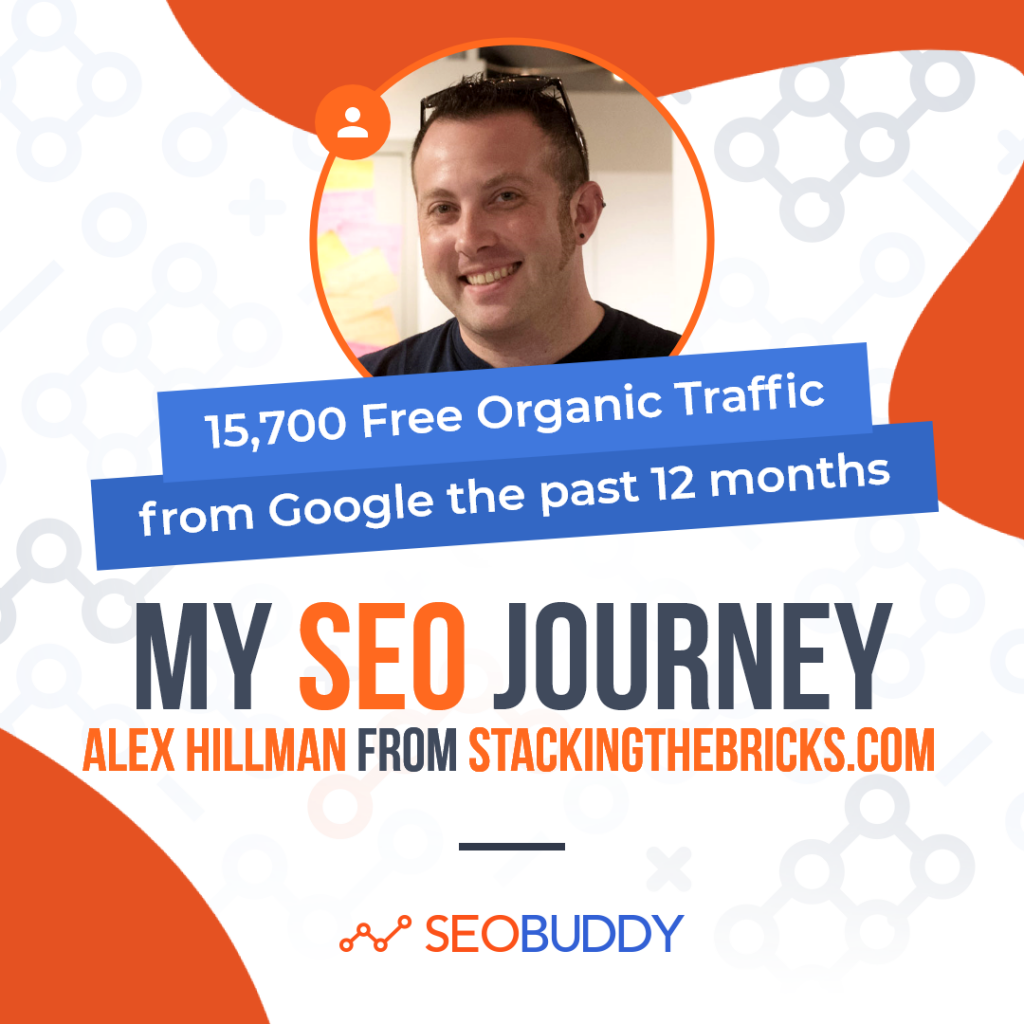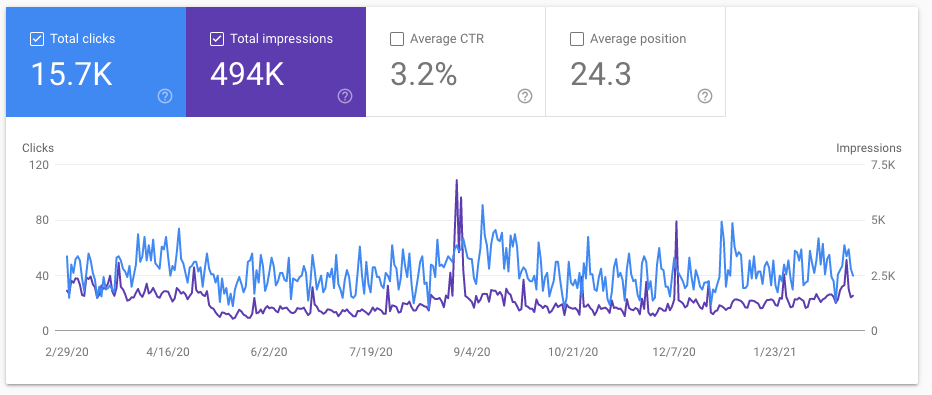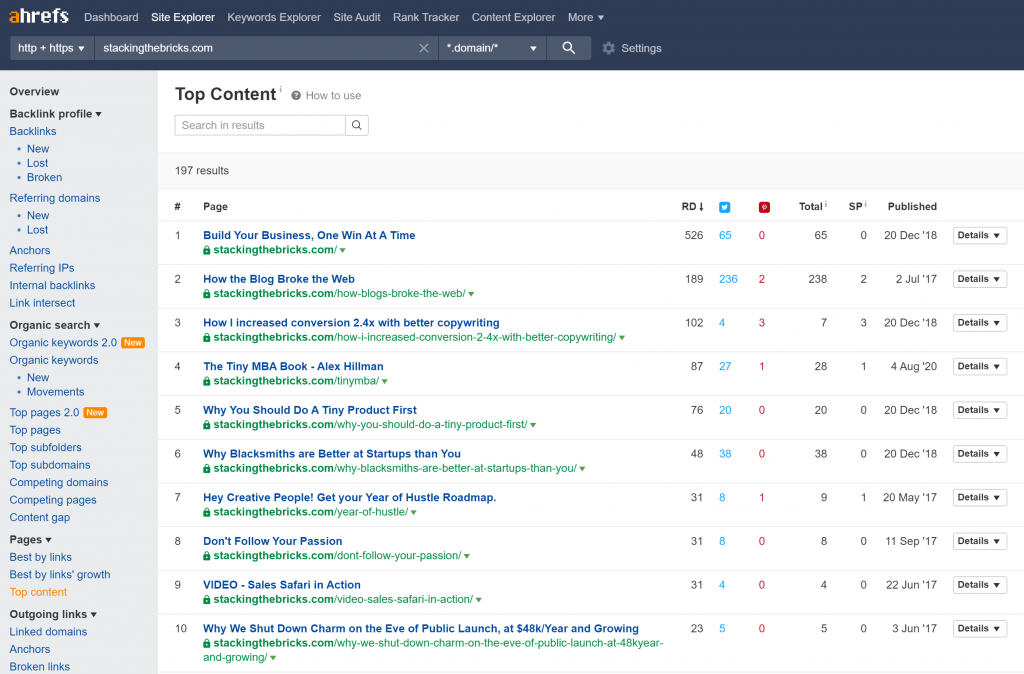My SEO Journey: Alex Hillman from stackingthebricks.com – 15,700 Free Organic Traffic from Google the past 12 months
My SEO Journey is a new series where entrepreneurs and Indie makers will share their honest SEO Journey filled with failure and success, and most importantly proven results. Episode #3 features Alex Hillman from Stacking The Bricks.

Hello! My name is Alex Hillman and along with Amy Hoy, we run a website and business called Stacking the Bricks. Amy and I both bootstrapped our businesses with no outside funding: Amy launched a time tracking tool for freelancers and agencies called Noko, and I started one of the first bootstrapped coworking spaces in the world.
Together, we realized that our bootstrapped approach was remarkably similar, even though our businesses were very different. We also realized that lots of creators like us were struggling to achieve similar results on their own projects and businesses, so we teamed up to share our approach.
Over the last 12 years, that goal has expanded to a library of articles, podcasts, videos, and products to help creative people launch a product people pay for on day one.
But if we’re honest…SEO has never been a cornerstone of our work or successes. Shocking! In fact, we’ve never put dedicated effort into SEO as a separate initiative, and we don’t actively teach any SEO techniques in our material!
Like I said, Amy and I both come from software and internet backgrounds, so we understand the basics of headlines, markup, and metadata. We have the basics covered by making sure our websites are fast and easily readable by Google.
But we’ve never really sat down and worked to optimize our websites or content for Google.
The thing we know (and that every SEO tells us) is that Google’s algorithm is built with the person searching in mind, not necessarily the company or domain trying to be found. That works in our favor because our approach to content marketing is all about creating content that is laser-focused on specific problems that our audience has, and offering detailed guidance, resources, and advice.
Rather than figuring out what Google wants, we focus on figuring out what our audience wants and how they communicate their problems. If we’re right, the search traffic follows.

Tips on hiring SEO Specialists or outsourcing?
We’ve never outsourced this – but if I were going to, I’d pick one specific aspect to optimize.
For us, the most obvious weakness is our article titles.
Our approach to article titles has been a bit more like writing email subjects, which are designed to persuade a reader to open the email. Seems like a safe bet that writing titles that are closer to the related search queries would help us get more search traffic!
What are your favorite resources, blog, influencer, to learn new SEO tips?
I’m lucky that we’ve got Wil Reynolds from SEER Interactive in our community here in Philadelphia, and I always learn something from the stuff he and his agency put out. Almost any article on their blog is going to be packed with expert SEO advice that’s easy to understand
They’re some of the best in the industry! I’m lucky to know a bunch of them personally and get to hang out in real life here in Philly, but you can learn a ton following them on Twitter or LinkedIn.
Your favorite(s) link building strategy

Some of our best (most qualified, most durable) inbound traffic is from our students mentioning us when they’re interviewed for podcasts, newsletters, and websites. For example, a bunch of our alums have been interviewed on Indie Hackers, like this one with Joel from egghead and this one with Dave Ceddia.
We’ve never run an analysis on it, but I’m pretty sure that podcast appearances of my own have helped too! Podcasts themselves tend to send long-term, durable traffic, so links included in the show notes are likely to provide similar impact.
Being an active member of the communities where you want to appear, not to sell, but to actually participate in the community, is hands down the most reliable way to show up in those places. That could be a Facebook group, a niche forum, a subreddit, Slack/Discord communities, even Twitter hashtags/lists, and Instagram comments.
It’s true that some communities are harder to find than others, but if an audience doesn’t go online, it’s going to be hard to market to them online in the first place, so if they really don’t exist online you’re probably barking up the wrong tree in the first place.
Regardless of where you find them, the key is thinking and acting like a helpful, trustworthy community peer rather than always pitching your own stuff.
What’s your current content strategy?
The key is remembering that you and your product aren’t the stars of the content that resonates the most. Your reader is. We aim to create content that people read, but more importantly that they can actually try and use and share.
That means making sure our content isn’t just “14 ways to XYZ” where everyone sounds nice but is so vague that they couldn’t actually implement it.
Instead, we focus on ONE angle or aspect at a time, with specific techniques and strategies, examples, and the detail needed to implement.
A great example is my best performing article ever My magic response to “Hey, can I pick your brain?” This is something that almost every creative person has experienced, and lots of people express frustration over.
Our best content is specific enough that whenever somebody mentions a problem, someone else goes “Oh, you’ve gotta read what Amy and Alex wrote about that.”

How do you tackle long tail keywords before aiming for the kingmaker keyword?
We’re hilariously bad at this.
A buddy offered to look up our keyword rankings for us recently and most of the things we rank for are our own names (Amy Hoy, Alex Hillman, Stacking the Bricks, 30×500, Tiny MBA); we also rank for some funny sayings that we use a lot like the “Shut up and take my money” quote from Futurama.
I used to feel like this was a problem, but my friend Jonathan Stark pointed out that “SEO only matters if you’re just one of many.”
We’re not out to own or dominate a category, so instead, we’ve focused on creating a category where we’re well known (thanks to our content) and have a strong, positive reputation.
This shows up in our numbers because people often assume that we’re much bigger than we are, including that we get way more traffic than we do. But we’ve never focused on traffic exclusively – cuz, not all traffic is equal.
We could spend a whole year boosting our search traffic only to learn that a tiny % of the people who find us via search are going to buy from us.
Instead, we have found success from a relatively small amount of traffic, but from sources where people are FAR more likely to convert.
- Our email opt-ins get a 3-5% opt-in rate.
- Our email list gets a 5-15% conversion rate to customers.
- Our sales pages convert a 10%+.
Could we do better with even more traffic than we get? Sure. But only if the traffic quality is good, and I’m not convinced that search traffic is always as good as the other sources we currently rely on!
Can you disclose some challenges you’re still facing today?
For everything I’ve said here about how our approach to reaching people has worked without relying heavily on SEO, we are in a position where we’d like to be able to reach some new audiences.
We’re great at reaching our current audience (mostly designers, developers, writers, podcasters, and other kinds of digital creators). But thanks to tech workers being such a large proportion of that audience it also skews overwhelmingly white and male.
Our goal is to support more people choosing alternative paths into entrepreneurship, which means breaking outside of that bubble.
It’s happening, slowly but surely! I’m confident that as long as we keep investing in the communities we want to reach, we’ll see the same kind of snowball effect we’ve seen in the past with our tech and design audiences.

Now it’s time to discover the other 102 steps that will get more organic traffic flowing to your website. Get the SEO Checklist here.
Want to get a sneak peek of what it looks like?
Enter your email and get a free demo version of the SEO Checklist.
What is your favorite tool?
My favorite new tool of 2020/2021 is Descript.
It’s completely changed the way we create and edit audio/video content for the better, saving hours of time with every episode. It also makes it easier than ever to pull out clips and segments for repurposing in new ways.
It’s one of the few tools that I can say with confidence does exactly what I want it to, and often, much more.

